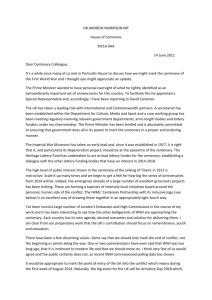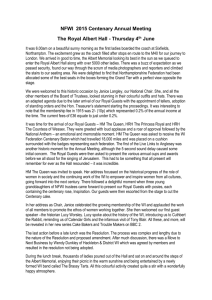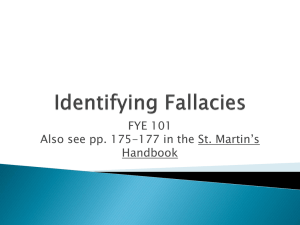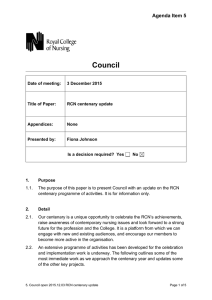Maria Miller speech at Imperial War Museum 06/03/14
advertisement
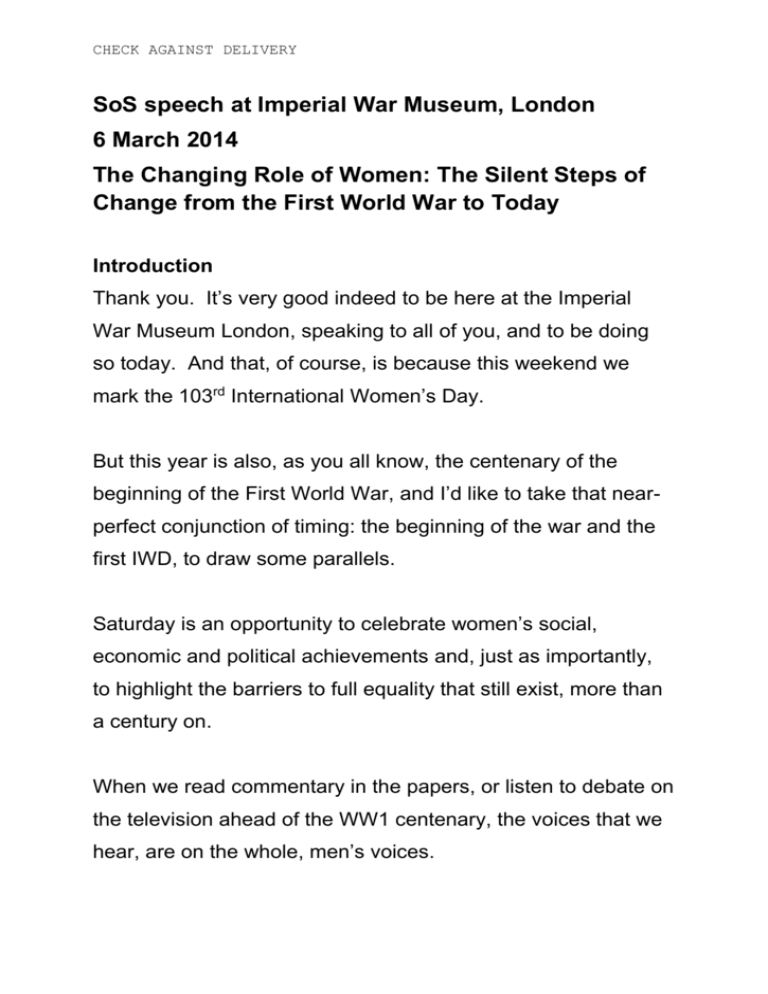
CHECK AGAINST DELIVERY SoS speech at Imperial War Museum, London 6 March 2014 The Changing Role of Women: The Silent Steps of Change from the First World War to Today Introduction Thank you. It’s very good indeed to be here at the Imperial War Museum London, speaking to all of you, and to be doing so today. And that, of course, is because this weekend we mark the 103rd International Women’s Day. But this year is also, as you all know, the centenary of the beginning of the First World War, and I’d like to take that nearperfect conjunction of timing: the beginning of the war and the first IWD, to draw some parallels. Saturday is an opportunity to celebrate women’s social, economic and political achievements and, just as importantly, to highlight the barriers to full equality that still exist, more than a century on. When we read commentary in the papers, or listen to debate on the television ahead of the WW1 centenary, the voices that we hear, are on the whole, men’s voices. CHECK AGAINST DELIVERY When we remember the millions of lives sacrificed, we are too often thinking only of the men in the trenches. But women back home worked hard and made sacrifices to ensure the war effort could continue. And there were women in uniform alongside the men in the battle zones. Women, never forget, also gave their lives. Then as now, I think, their contribution is too often overlooked. The hard facts of women’s lives 100 years ago Let me begin with a few hard, simple facts. At the outset of the war 3.2 women million were in work. Paid employment for women was not a new phenomenon, but most of the jobs they filled were low paid: in textile manufacturing or domestic service. Over the next four years, though, a further 1.6 million would join the workforce. This figure includes over 950,000 women working in munitions, many of whom would die alongside male colleagues in accidents or explosions – their deaths commemorated by the Chilwell and Silvertown memorials, amongst others. Still more – over 400 women – would die of chemical poisoning contracted in the factories. CHECK AGAINST DELIVERY Then – as now, I’m afraid – child care was a problem for women wanting to work. The Government of the day did, in fact, provide some funds for day nurseries – more than 100 across the country – but only for munitions workers. For the rest it was generally a case of having to rely on a patchwork of friends and families, a state of affairs that persisted for many decades after the war, of course. These days, thank goodness, things are a lot better - we have taken great strides to address the problem. To give just two examples, we are introducing tax free childcare, and we’re funding 15 hours a week of free childcare for disadvantaged two year olds and the same for all three and four year olds. And these wartime working women never earned equal pay to men, even when doing identical work; and many of them lost their jobs when the war ended and the troops returned. But for all that, society - and women’s expectations - had been changed for good. But it’s not simply a case of the course of the First World War triggering a social upheaval. The war was a catalyst for something that was already in train. CHECK AGAINST DELIVERY Back on the first IWD in 1911, for example, more than one million women and men attended rallies, calling for the right to vote, the right to work, and the right to hold public office. What the war did was to pull threads together, ultimately bringing about a gradual but fundamental transformation in attitudes and expectations. These silent steps of change took many forms. Many women were forced into employment by the deaths of their husbands, others filled critical gaps in the workforce caused by the military conscription of men in 1916. Women stepped up partly because, in desperate times, they had no real choice, but more significantly because they were marching to a beat that had started some years before. The war was also a catalyst for female emancipation: in November 1918, as the war ended, some women were given the right to vote, although it would be another 10 years before women were given the right to vote on the same terms as men. Then in 1919 Nancy Astor became the first woman to take her seat in Parliament as a Conservative MP. CHECK AGAINST DELIVERY And so the ‘silent steps’ I just mentioned didn’t falter. And it’s interesting, I think, to note that history tells us that it is very often in the most challenging periods that women’s emancipation has made most progress. Times of military conflict, periods of peacetime austerity, moments of cultural upheaval like the 1960s – they have nearly always coincided with progress for women, the moments when the steps forward quickened. Of course women are able to rise to the challenge. And when they do, the cultural expectations that held them back become secondary. It becomes clear that the barriers imposed are entirely artificial and arbitrary. Women and the First World War Centenary So women have much to reflect on during the First World War centenary. And as both the Cabinet Minister leading the Government’s programme to mark it, and Minister for Women and Equalities, I am reflecting on it too. The truth is that no commemoration of the First World War would be complete without explicitly recognising the role and contribution of women. CHECK AGAINST DELIVERY And so to ensure that the contributions to the war effort of women – and the sacrifices they too made - are properly considered, I can announce today that I have invited both Kate Adie and Mary Beard to join the First World War advisory panel that I chair, who will add valuable insight, expertise and perspective. I very much look forward to working with them. As I have said the role of women during the FWW needs to be further highlighted, and so I’m also pleased to be able to tell you this morning that the Heritage Lottery Fund will today announce funding for a number of projects specifically to commemorate the role of women. These include: War Women on the Home Front - exploring North East women's role in FWW – looking at themes such as work, family life and how returning soldiers who were experiencing shellshock affected their women and families; Mabel Stobart: A Dorset Woman At War – a project looking at the establishment of a female-only medical corps in the FWW; and CHECK AGAINST DELIVERY Women of Thanet - Sisterhood and Solidarity 1914-18 - an eight month project to explore the impact of the First World War on women living in Thanet, looking at women’s changing roles during the war, their impact on the war effort, and the rise of the suffragette movement. In addition, I will also be listing today the Leeman Road District War Memorial in York which commemorates the women killed in an accidental explosion at Barnbow munitions factory in 1916. This listing is part of a wider programme being led by English Heritage to give formal protection to many more war memorials, supported by a special £5 million fund to restore and refurbish them for many generations to come. The part played by women in the First World War has often been understated. ‘Keeping the home fires burning’ is a cosy image that might well have fitted with prevailing attitudes a hundred years ago but, as I have already suggested, it was very far from the truth. There will be many stories told over the next four years of the part played by women, and there is one in particular I wish to honour today. CHECK AGAINST DELIVERY I am particularly pleased that the Princess Royal’s Volunteer Corps are here this morning. For they have a fascinating story to tell in this context which highlights the often unsung role of women. Created in 1907, they were a first-aid link between front-line fighting units and the field hospitals, and crucially they were made up of women. During the First World War, their female volunteers ran field hospitals, drove ambulances and set up soup kitchens and troop canteens, often under highly dangerous conditions. By the Armistice, they had been awarded many decorations for bravery, including 17 Military Medals, 1 Légion d'Honneur and 27 Croix de Guerre. They are still in service today providing response teams in London during major events or incidents, and they will help deliver some of the centenary commemorations. In recognition of their ongoing role, I’m pleased to announce a funding package that will enable the corps to update their technology, and help with their endeavours. CHECK AGAINST DELIVERY How times have changed As we approach the FWW centenary, now just 150 odd days away, it is also a good time to consider how women’s lives have changed in the intervening years, both to reflect on how far we’ve come, and challenge the unfairness and prejudice that can still stop women making the most of their potential. I think all of us in this room would agree that, now as then, the contribution of women in all walks of life is not always valued or recognised as it should be. If we are going to be a successful economy we have to harness the talents of every member of society – women need to have the opportunity to fully contribute and not face artificial barriers or - worse - prejudice, be it institutional or otherwise. I appreciate too that cultures and attitudes cannot be changed overnight. But there are a lot of positive things to highlight: many things that we can be very proud of indeed. CHECK AGAINST DELIVERY For example, it was women that won most of the British Olympic medals at Sochi. And women are running successful businesses in areas that previously would have been considered the exclusive preserve of men. And they’re leading the way in academic and scientific research. And, yes,they’re serving with distinction alongside men in the emergency services and in war zones. For all that, though, it is surprising (to put it mildly) that now, in the 21st century, there are still boards in our top businesses and institutions that do not include a single woman. But these, thank goodness, are in the minority. The cultural shift 100 years later is undeniable, but still has some way to go. A young girl starting out on her journey through education today can choose from a dazzling range of options, compared to the limited choices she would have faced in 1914. Before the war, girls’ education was designed to prepare them for the lives they were expected to lead, as wives and mothers. Their curriculum was limited to English, maths, housewifery and domestic studies. CHECK AGAINST DELIVERY Career options for girls before the war were largely limited to what was then deemed as low-paying, “women’s work” such as dressmaking, secretarial work and domestic service. Today, far from being limited by their education choices, girls in the UK are excelling. They’re out-performing boys at school and university: this year a quarter of GCSE exams sat by girls were graded A* or A, compared with around a sixth of those sat by boys. Aiming High As a consequence of the progress we’ve made, far more of us are working and contributing both to our families’ income and the wider economy. Today, there are more than 13.6 million women in work bringing home a pay packet. That’s more than 400 per cent up on those 3.2 million women in work in July 1914. Better yet, there are now record numbers of women in work nearly 200,000 more today in fact than a year ago, and 68,000 more self-employed. CHECK AGAINST DELIVERY And while we’re on this subject, businesses set up and run by women contribute £70bn to our economy. Not something we often hear about. Things have changed so much that we now have flexible parental leave and it’s not automatically assumed that the woman will be the one to remain at home. We’re modernising the workplace – which is long overdue – and reshaping it, so it is no longer a place designed by men for men. Women can’t be forced into a false choice: family or work. Modernising the workplace recognises that both sets of responsibilities sit side by side. These, then, are the silent steps of change that have taken place, and which each and every one of us should welcome. Conclusion So the message I’d like to leave you with this morning is simple. Yes, The First World War made a real difference for women and their place in society, transforming their lives, attitudes and aspirations. CHECK AGAINST DELIVERY But our hopes and dreams as women should never allow us to say ‘Yes, thank you, but I think that’s enough.’ There’s always more to do. And we in Government, and you as role models in your respective worlds, should never forget that. Never stop pushing for true equality of opportunity – for a society which values the participation and contribution of women on their terms. The FWW centenary gives us an opportunity to reflect on the journey society has taken over the last 100 years when it comes to equality. It has been a long one, with many triumphs along the way, but it is not yet finished, and let’s all of us make sure that it’s a lot less than a further 100 years before we get there. END


